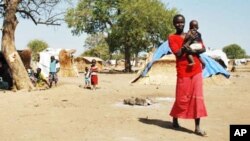On July 9, Sudan splits in two, with the south becoming an independent nation. Once that happens, how should the international community interact with northern and southern Sudan? A new report from 22 international NGOs tries to answer that question.
Beyond the Pledge: International Engagement after Sudan’s Comprehensive Peace Agreement was released Friday, a week before South Sudan’s secession.
“A concern of the report is that the engagement of the international community doesn’t stop on the 9th of July. There’s an enormous amount of change happening all the time in Sudan…and the response of the international community needs to keep moving with that,” said Olivia Warham, head of the London-based group Waging Peace.
The report said much of the current response has focused on southern Sudan’s independence.
“However,” she said, “in terms of the issues that the country is facing, [it] will by no means end the very numerous problems that they have at the moment.”
Threats to peaceful co-existence
There’s currently fighting in Southern Kordofan State. Tens of thousands of people have been displaced, but aid agencies have limited access to them. In May, there were clashes in the oil-rich Abyei region. An Ethiopian peacekeeping force will be sent to Abyei under a recent agreement that also calls for northern forces to withdraw.
“In Southern Kordofan the fighting is continuing and although the parties are talking, they haven’t yet reached an agreement for the cessation of hostilities. So, I would say that that is obviously of utmost concern in the short term,” said Warham.
The long term
“There are various issues to be concerned by. One is the economic situation for both the north and the south. They are incredibly dependent on oil, which means that their countries are both going to be destabilized by the split,” she said.
Warham said both the north and the south have failed to diversify their economies to lessen their reliance on oil.
Beyond the Pledge tells the international community that “brokering a resolution to the current border crisis is the most urgent task, but one that must be coupled with resetting relations with North and South Sudan over the longer term.”
“The NGOs involved in this report are concerned by, and Waging Peace in particular, the relationship that has built up, particularly with the north, but potentially with the south as well, whereby there is not enough criticism over actions that have taken place,” she said.
For example, she said, the north continues to bomb areas of Darfur in western Sudan “with impunity.”
“This year there have been almost daily attacks, with civilians being killed all the time. Humanitarian access to the camps is very, very limited, so people are dying of malnutrition and disease if they’re not being killed by bombing attacks,” she said.
The report calls on the international community to be “heavily engaged” with the north and south after the Comprehensive Peace Agreement expires on July 9. But it says engagement with the north must increase to help bring an end to the Darfur conflict.
Donor community
According to the report, “Reforming international donor assistance mechanisms is also critical. Development and humanitarian priorities should be better supported on both sides of the border and help provide a genuine peace dividend for all Sudanese.”
“I think that’s it’s crucial that it keeps its relationship with the north as donor countries because… the economic situation in the north is going to become extremely unstable in the coming months. They’ve already been suffering from the effects of secession. And that means that they need all the help they can get,” said Warham.
China
Sudanese President Omar al Bashir visited China this week. China is a major investor in Sudan and gave Bashir a warm welcome, despite calls he be apprehended and turned over to the International Criminal Court. In 2008, the court issued arrest warrants for the Sudanese leader for war crimes, crimes against humanity and genocide relating to Darfur.
However, what happened in private may play a greater role in Sudan.
“Through various contacts, Waging Peace has been told that the Chinese are taking a much stronger stand with Sudan on their record of stability within the country. Because obviously it’s not a viable country at the moment with the amount of fighting that’s going on,” she said.
Warham said trade with Sudan is a major opportunity to influence the Khartoum government.
Other recommendations
The report also recommends to the international community to “hold the Government of South Sudan to its obligations to uphold the human rights and fundamental freedoms of its people, including honoring existing commitments to political consultation and pluralism, and entrenching strong protections for the media and the right to freedom of expression.”
It proposes strong support to fight corruption and sustainable demobilization, disarmament and reintegration programs as part of reforms for the Sudan People’s Liberation Army.




